Venerable Margaret Sinclair Pilgrimage
This annual event takes place at St Patrick's in The Cowgate, Edinburgh, on Sunday 21 September 2025. This year we mark the centenary of her death. Schedule to follow.
This annual event takes place at St Patrick's in The Cowgate, Edinburgh, on Sunday 21 September 2025. This year we mark the centenary of her death. Schedule to follow.
Here is the Homily of Archbishop Leo Cushley on The Passion of the Lord, Good Friday, St Mary's Catholic Cathedral, Edinburgh.
***
My dear friends,
Last night in our celebration of the Lord’s Supper we accompanied the Lord as he began to tread the Via Dolorosa, the way of pain that leads Him to the Cross.
Today, he continues along that Way, humbly, willingly, for us.
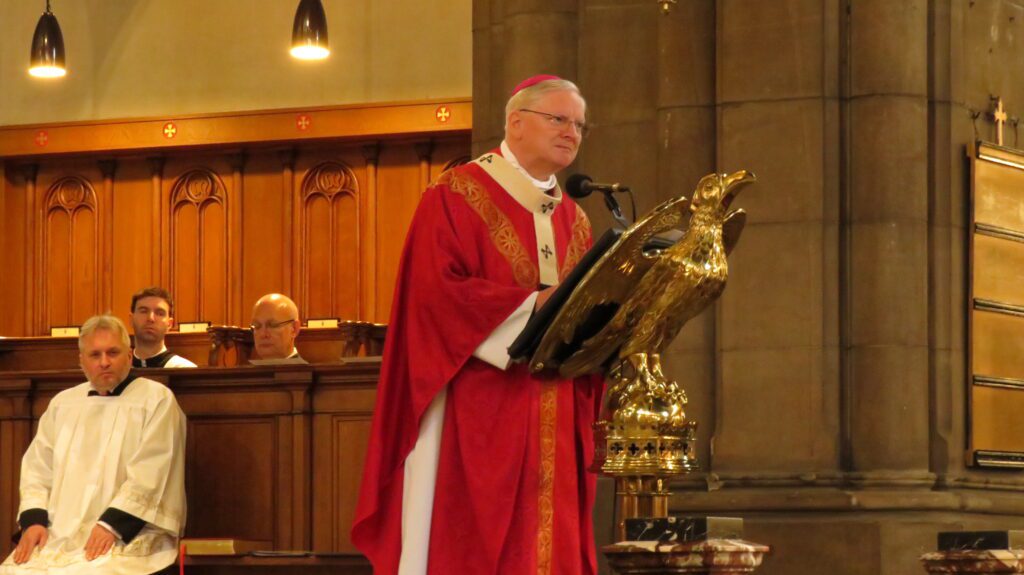
Externally, he appears powerless, a victim, an innocent, powerless lamb led to the slaughter with no one to vindicate Him.
There is no one to rescue Him, no one to argue on His behalf, or offer a word or a gesture that can save Him.
There appears to be nothing he Himself can offer to say or do that will spare His life.
"On the Cross, Jesus reveals Himself as the Truth...He is the dazzling reality of the God who sets us free in His victory on the Cross." - Archbishop Leo Cushley. pic.twitter.com/PuFVROfa8U
— Archdiocese of St Andrews & Edinburgh (@archedinburgh) April 18, 2025
In mockery he takes the place of Barabbas, a murderer, a revolutionary, and yet he is the precise opposite: he is someone who brings life, not death, someone who wishes, not to destroy but to build up and to bless and to heal.
Jesus appears powerless in the face of raw power: three very different, competing interests combine to destroy Him:
The injustices and falsehoods pile up and triumph. Where is the truth in any of this?
At a crucial moment, Pilate poses this very question, the question about truth.
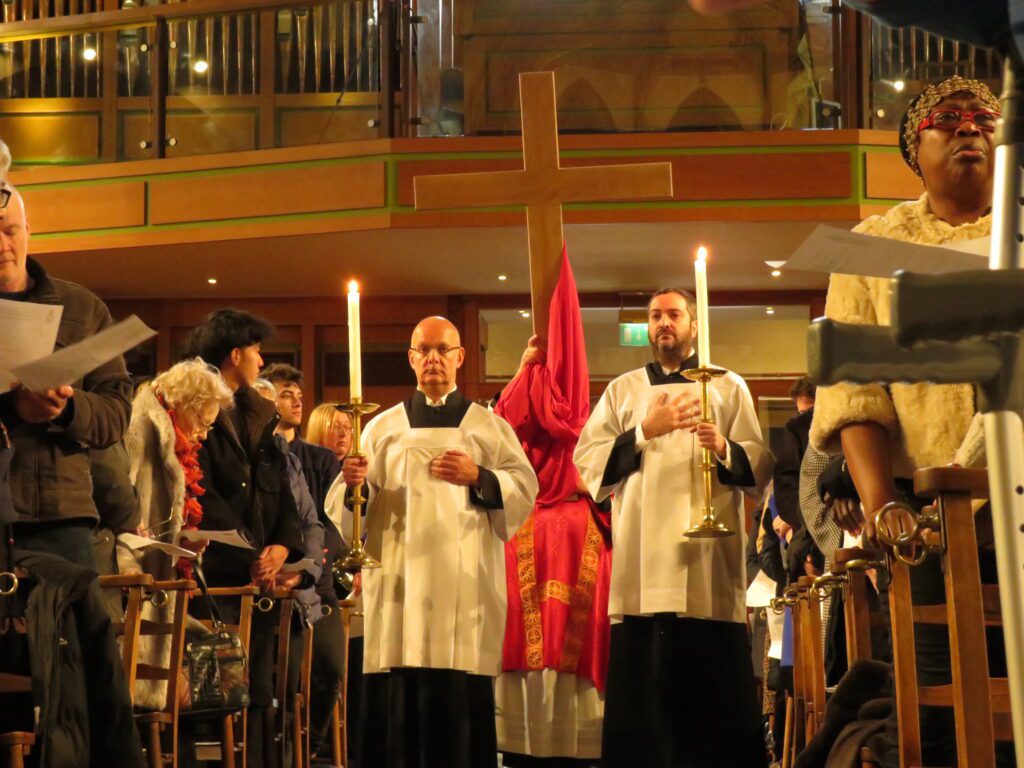
Pilate’s question appears at first almost casual, but it is a well-placed one.
In interview with Jesus, Pilate asks Him: “Are you the king of the Jews? […] Your own people have handed you over, what have you done?”
Jesus says, “I have stood up for the truth.”
And famously, Pilate replies “Truth? What is truth?”
This being St John’s Gospel, there are of course several things going on here all at once.
Pilate is an educated man, he knows philosophy, he knows that this could make for an interesting academic conversation.
But here, his comment is ultimately rhetorical, and he can hardly be thinking of conducting a discussion about truth.
This is not the place and time.
He can see that truth is secondary to what is unfolding here.
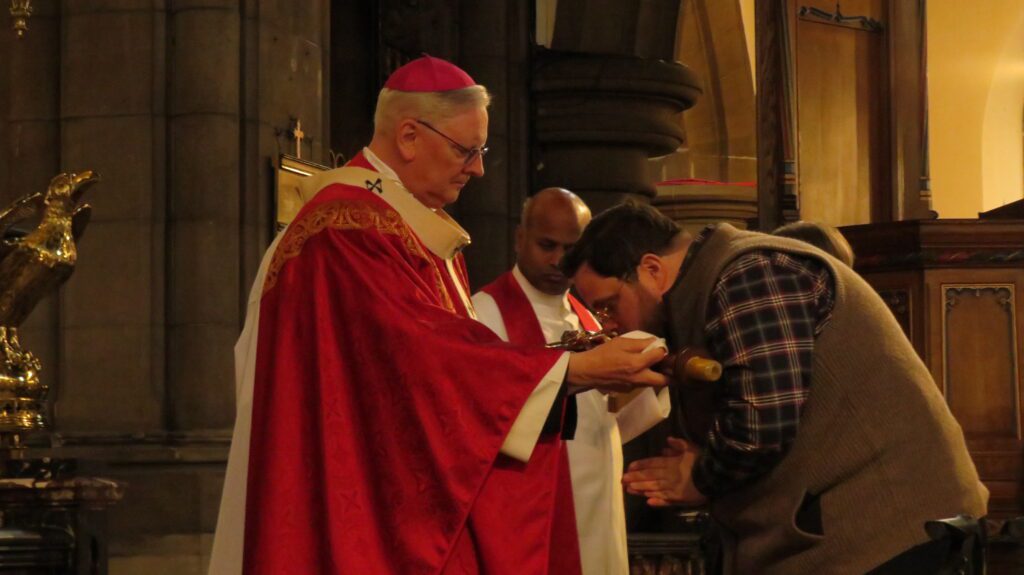
More likely is that he is working out how to keep the peace; if he should spare Jesus from death, and if it’s going to lead to a riot, and less about if it’s the right thing to do.
So, at first, he tells the mob that he finds no case.
By this, he tests the water, but he quickly realizes that Jesus’s death is the only way to restore calm - and so Jesus is condemned to death for pragmatism, convenience, for the sake of the peace.
What this also means of course is that truth is irrelevant. The authorities press their demands, the mob threaten a riot, and the innocent die. Truth is nowhere to be seen.
Except that in the midst of this injustice, Truth is present; but it is hiding in plain sight. Truth is standing there before them all.
St John is telling us that Jesus Christ is the Truth. He not only speaks the truth, or represents the truth.
Jesus is the Truth. He tells us that He came into the world for this.
Jesus Christ is the Truth of the Most High God, and the truth will set us free.
And it’s not 24 hours since Jesus, the night before, told Thomas and the Apostles “I am the truth”.
Jesus Christ is the Truth of the Most High God, and the truth will set us free.
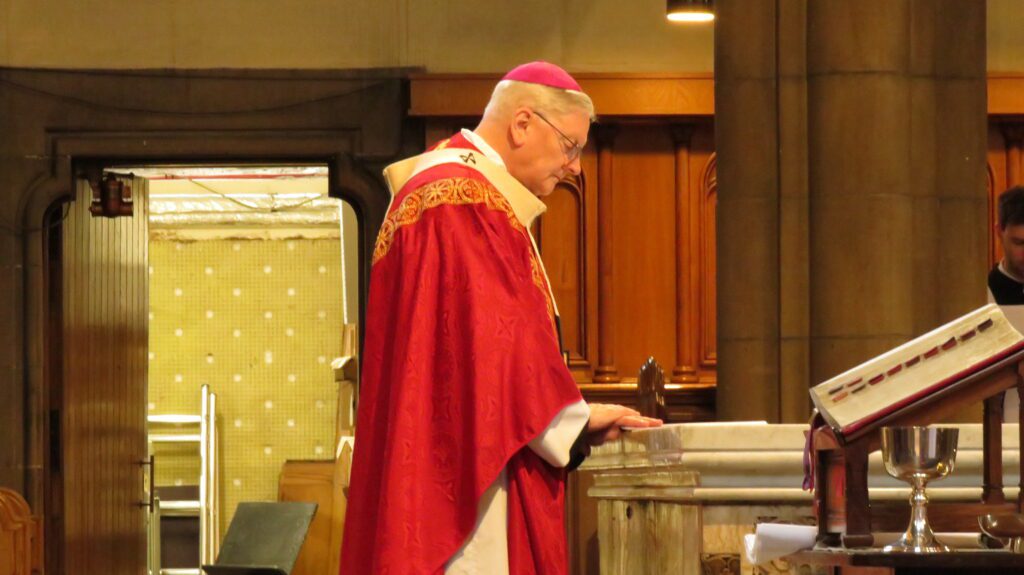
So that, even as Jesus is bound, arrested, and condemned before Pilate, even as He is shortly to be taken, bound, to the Cross, and to be nailed to it in mockery and to die an impotent spectacle, He is the one setting everyone free.
On the Cross, Jesus reveals Himself as the Truth, and that Truth sets us free.
The objective, simple truth, the reality here, is that the Son of God willingly and purposefully dies and does so for us all.
The Truth revealed in the person of Jesus stands before Pilate. Today, that Truth is not to be found in Roman law, or the caprice of the mob, or the expedient politics of the day.
Jesus Christ, is the Way, our way through death to life.
And today He is the Truth: He the dazzling reality of the God who sets us free in His victory on the Cross.
Archbishop Cushley tonight celebrated Mass of the Lord's Supper, which marks the beginning of the Easter Triduum.
It is an important time for the Church because at the last supper Jesus instituted the Eucharist, the source and summit of our Faith.
Holy Thursday: The Blessed Sacrament is taken to the Altar of Repose at St Mary's Cathedral in Edinburgh. The Cathedral remains open for prayer at the Altar of Repose until 11:30pm. pic.twitter.com/H8p0U8597o
— Archdiocese of St Andrews & Edinburgh (@archedinburgh) April 17, 2025
He also washed the feet of his disciples as an example of loving service to others and that is what priests do at the Holy Thursday Mass.
Archbishop Cushley said: "Tonight we accompany Jesus on his way to Calvary.
"We anticipate his sacrifice on the Cross; we do so solemnly this evening in communion with him and with all Christians throughout the world; and we keep in mind its intimate links with what will take place tomorrow.
"Tonight, in the Eucharist, Jesus becomes for us not only food for the journey, but the very Way for us."
***
Homily of Archbishop Leo Cushley of St Andrews & Edinburgh, Mass of the Lord’s Supper, 17 April 2025
My dear friends,
Tonight we accompany Jesus on his way to Calvary.
We start with the Lord at table at the Last Supper, the origins of the celebration of the Eucharist so central to our memory of the Lord, keeping his memory alive and his presence among us in the Eucharist.
As Catholics, we see clearly the link between the Lord’s Supper and the Cross on Calvary and, knowing the trajectory of the story, we can see that it is a way that leads from the Upper Room, to Calvary, to the tomb, and indeed to the empty tomb.
And the whole three days are a kind of a “way”.
We sometimes refer to events tomorrow, Good Friday, in Jerusalem as the via Dolorosa or the via Crucis or the Way of the Cross.
But the term “the way” was also one of the very earliest equivalent names for “the Church”, and we find it in the Acts of the Apostles and elsewhere.
But the use of the word the “way” that we find even there, and about being faithful to the “way” has overtones of something else.
Clearly “the way” can suggest a manner of living, or a means to reach a place or purpose or object.
In that case, “the way” becomes an early stand-in for a word like “community” or “assembly”, it works well, and did so for a time in the early days of the Church.
But “the way” as a term also takes us back to something very important that Jesus says to the Apostles, while talking with Philip and Thomas at the last Supper, in fact tonight.
Just before the passage we heard in tonight’s gospel, Jesus says to the Apostles, “Let not your hearts be troubled; believe in God, believe also in me […] and you know the way where I am going”.
Thomas replies to this, “Lord, we don’t know where you’re going, so how can we know the way?” And Jesus replies, “I am the way, and the truth and the life; no one can come to the Father except through me.” He then turns to Philip and adds, “From now on you know the Father and you have seen him.”
Two essential things for us emerge from this that we ought to keep in mind across all these three days.
First of all, we should remember that Jesus is the Son of God and that in him we see God himself. To see him is to see God.
Not only that, this means that God himself is going to his death for us on Calvary tomorrow, and that he anticipates the sacrifice of the Cross here and now, at the Last Supper, tonight.
The second thing for us to keep in mind is that Jesus is the Way: he is God among his people, showing us, not just a way to live but a way to life, the way to life eternal in Jesus Christ.
This Way, the way to life, does not eliminate the pain of life or the necessity of death, but it transforms death from a dead end into a passage, a passing through death that leads us to life in Christ.
One of the most beautiful rites that we have as Catholics is when we are able to receive holy Communion before we die.
The prayers are particularly powerful and describe the Eucharist as “food for the journey”, the journey through death and into life.
For this reason, we call it Viaticum, that is, quite literally, food for the journey. And tonight, we have a chance to see how this fits perfectly into our understanding of what the Lord does here at table, the night before he dies.
Our Eucharist tonight is viaticum, it is food for the journey, as we anticipate and associate ourselves with the Lord’s terrible and wonderful journey through suffering and death, and into life.
Tonight, then, Jesus anticipates his passage through death on the Cross tomorrow, in the Last Supper celebrated now.
In it, we can anticipate his sacrifice on the Cross; we do so solemnly this evening in communion with him and with all Christians throughout the world; and we keep in mind its intimate links with what will take place tomorrow.
Tonight, in the Eucharist, Jesus becomes for us not only food for the journey, but the very Way for us.
The Lord’s Supper tonight is not just a way to live but a way to life, the way to life eternal in Jesus Christ.
More than 70 priests gathered at St Mary's Cathedral in Edinburgh last night for the annual Chrism Mass.
The Chrism Mass is where the bishop consecrates the sacred chrism (a mixture of olive oil and balsam) and blesses the other holy oils (oil of catechumens and oil of the sick).
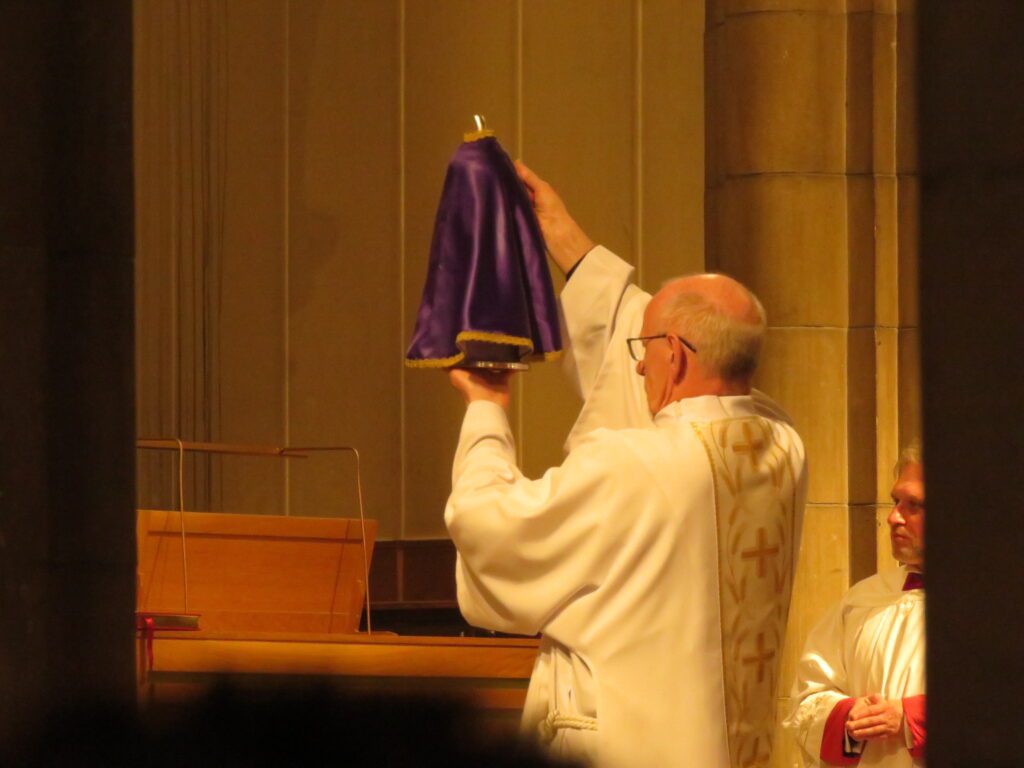
These oils are then taken home by priests and appointed parish volunteers for use in the parish over the year.
The Chrism Mass is a sign of the close bond between the bishop and the priests of the diocese, and priests renew their commitment to their ministry.
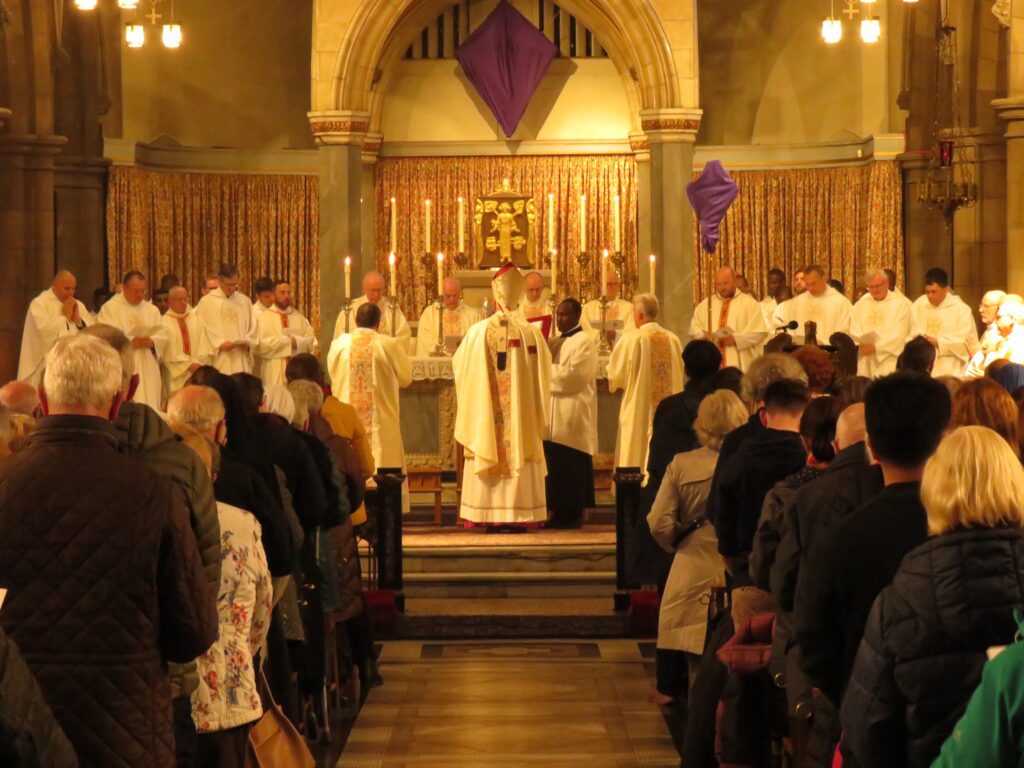
In his Homily, Archbishop Cushley said: "As the clergy renew their promises this evening...may we who already have the gift of the Spirit learn again to let the living Lord speak to us in the depths of our hearts; and, encouraged and strengthened by that indwelling gift, may we in our turn give the warmest of welcomes to those joining us this Easter."
Homily of Archbishop Leo Cushley of St Andrews & Edinburgh, Chrism Mass, 15 April 2025, St Mary’s Metropolitan Cathedral, Edinburgh
My dear brother deacons and priests, dear brothers and sisters in Christ,
A very warm welcome to our Chrism Mass in this Jubilee Year, dedicated by the Holy Father to the theme of hope.
This celebration not only distinguishes us in our various services to each other, it also gathers us in unity around our High Priest, Jesus Christ.
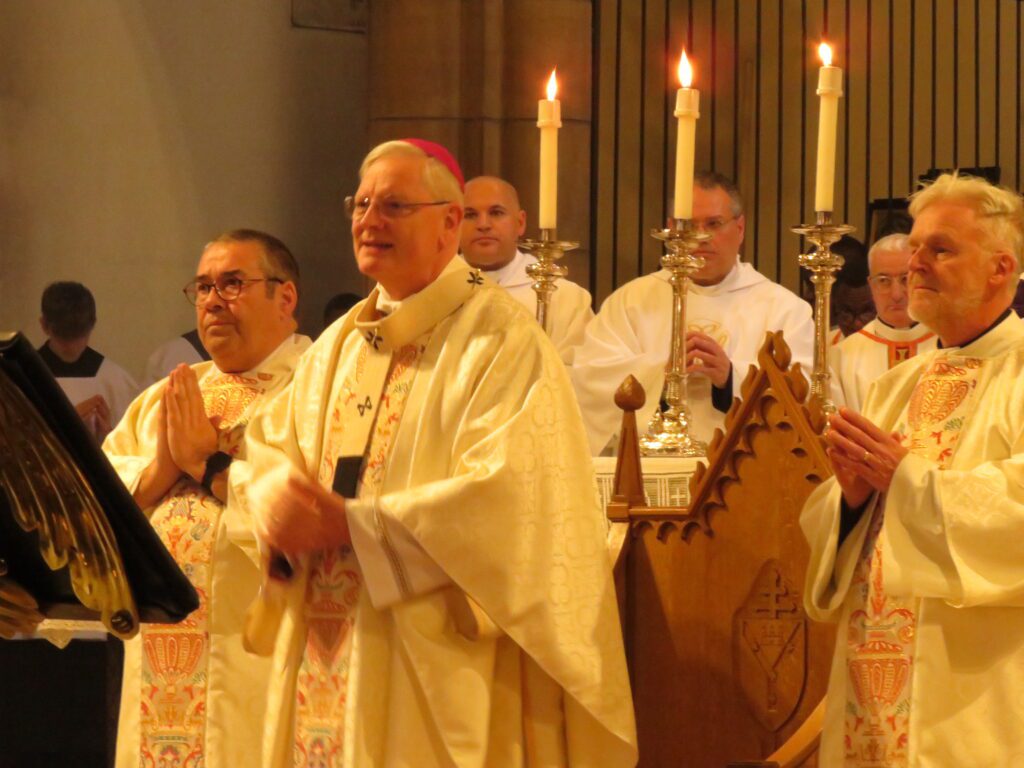
We have all been anointed, we all share the same Spirit, we have all been called, ultimately, to the same dignity, that is, Life with Christ.
We take our different places, as St Paul says, in Christ’s Mystical Body, but always with a view to the same end, the same good, the same purpose: union with Christ, and its essential corollary, union with each other.
And union with each other is no mere optional extra. Christianity is not a private relationship.
The sign of peace that we offer each other, during Mass, is no mere handshake or peck on the cheek.
The Spirit is at hand in each one of us, to comfort and encourage, and to strengthen hearts and limbs that are weary.
It is a sign of communion with Christ and with each other, a modest token to be sure, but the sign of an eternal and solemn pledge of love, of loyalty, and of union with all present as we gather in the Spirit around our living Lord Jesus Christ.
The Spirit that we receive then, especially in the Sacrament of Confirmation, is like the mortar that builds us poor, small, living stones into a great spiritual house, fit for the Most High God to dwell in.
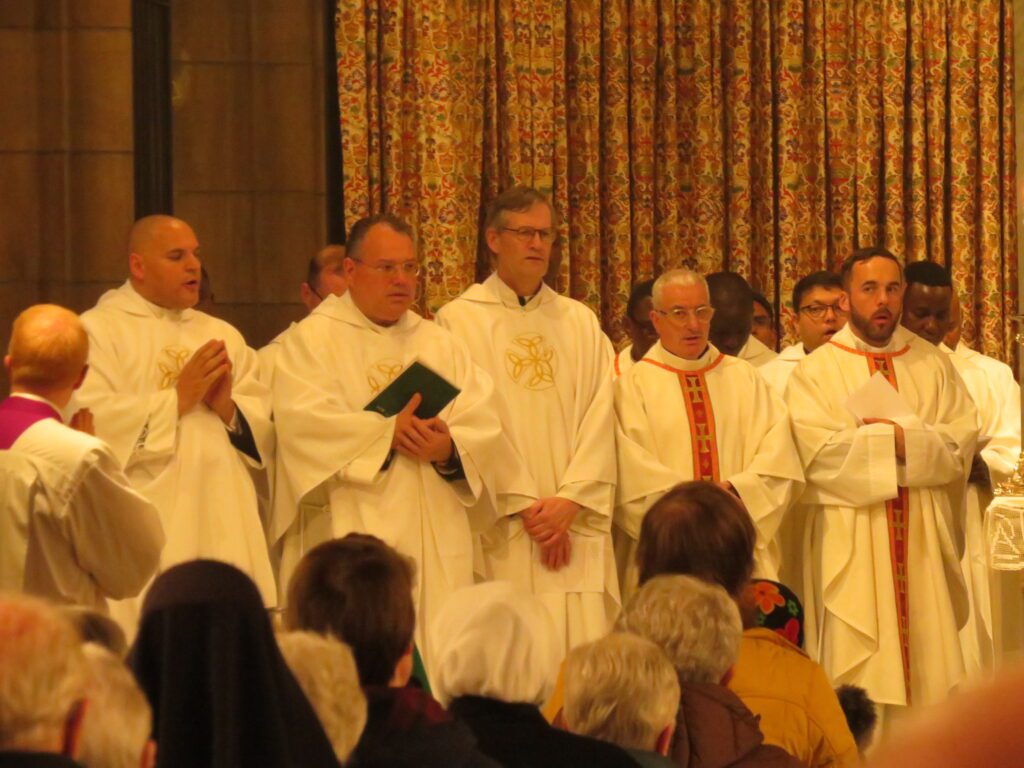
That loyalty towards each other often goes unremarked, unsaid, until tests of it come along, and of course, tests do come, sometimes from within and sometimes from without. They come in the form of words and gestures and actions, intended or not.
They come in scandal that dismays us, they wound a pride or self-regard that is never far from the surface.
Then our love and loyalty can be tested bitterly, but at such times, we need to remember that the Spirit, which was poured so generously into our hearts, is not a distant souvenir of an event long past; the Spirit is alive and active among us.
It is a Spirit of comfort, of healing, of gladness; it is a Spirit that brings good news, and a joy to be shared by the whole people.
The Spirit is at hand in each one of us, to comfort and encourage, and to strengthen hearts and limbs that are weary.
If only we would learn to be still again before the Lord, to be trusting, humble and open in His presence, and to listen to the Spirit that is within us, ready to refresh, console and inspire us anew.
As we hear today, in a passage from Isaiah, sought out and read to us by the Lord Himself as he stands in the synagogue in Nazareth, the Spirit of the Lord is upon us, today, here and now. It is a Spirit of comfort, of healing, of gladness; it is a Spirit that brings good news, and a joy to be shared by the whole people.
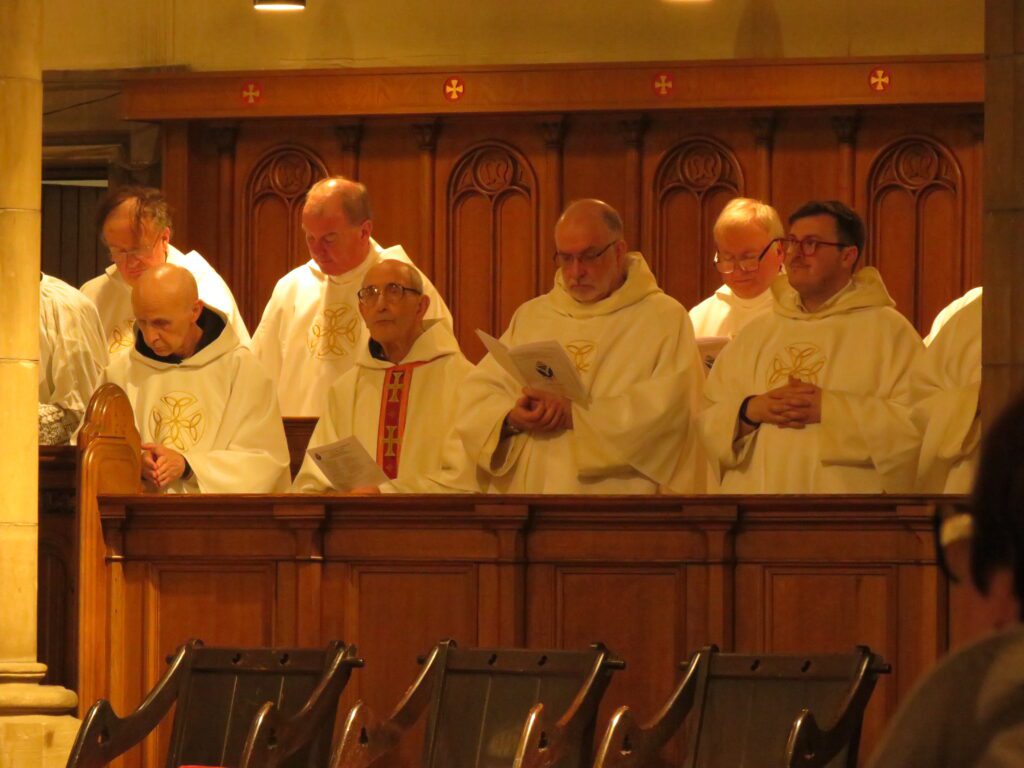
This year is a Holy Year, and so it is also a time of liberty from the bonds of sin and sadness, as the Holy Father has emphasised, a Jubilee Year dedicated to hope.
We see deeply troubling events unfolding in the world in these days, and we must wonder sometimes what there is to be hopeful about, but the Lord is still at hand to assist us.
Men and women of goodwill, inside the Church and outside it, still work to identify the common good, and having identified it, to pursue it and to promote it.
The bullies, and the powerful will one day reap their just desserts.
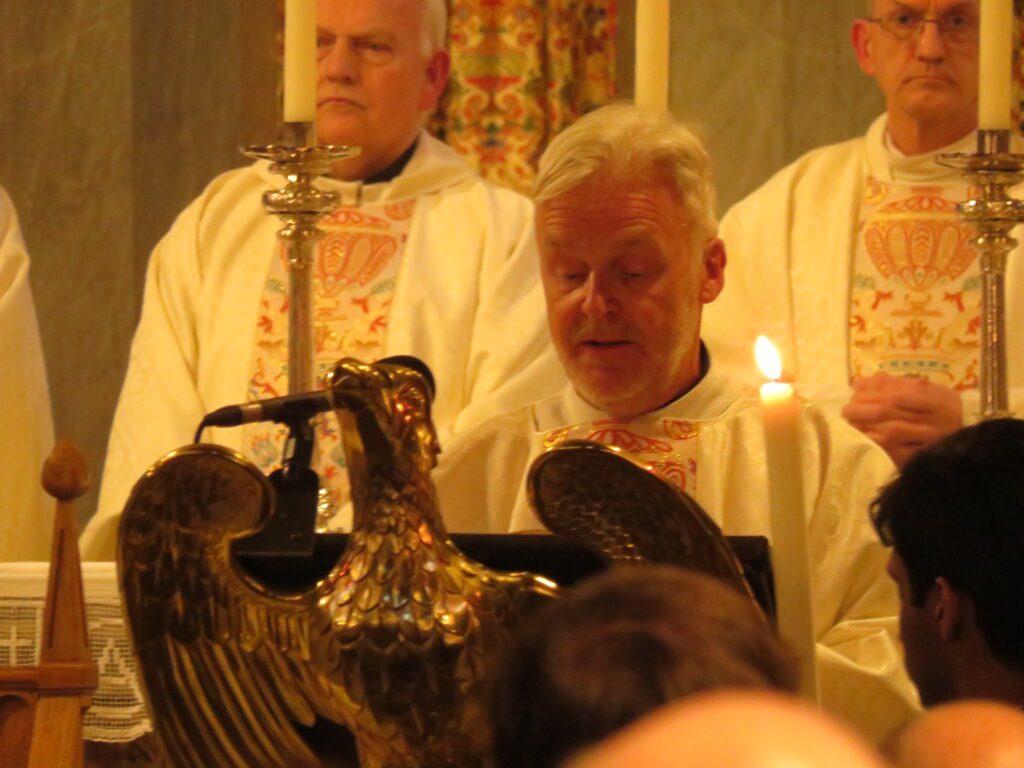
And the just will receive the reward of their patience and their labours and their goodness.
This is the message of this jubilee year, and it is the message of our Chrism Mass texts.
The spirit of the Lord has come abundantly upon our Lord Jesus, as he has shared that same Spirit with all of us here today.
As the clergy renew their promises this evening, and as the whole diocese prepares to welcome hundreds of new Catholics into the Church this Easter Vigil, many of them young adults, may we who already have the gift of the Spirit learn again to let the living Lord speak to us in the depths of our hearts; and, encouraged and strengthened by that indwelling gift, may we in our turn give the warmest of welcomes to those joining us this Easter.
Thank you for listening, and may God bless all your preparations for the Triduum!
Here's is information about the Sacred Triduum at St Mary's Cathedral, Edinburgh, along with other events happening in Holy Week.
Monday
Stations of the Cross. Includes a reflection from Bishop Frank Dougan of the Diocese of Galloway. 7:45pm on Zoom. Register: bit.ly/stations25
Pergolesi Stabat Mater by Genevieve Evans and Emma Hocking, St Mary's Cathedral, 7:30pm.
On Monday of Holy Week, 14 April at 7:30pm, join us for a performance of Pergolesi’s famous Stabat Mater.
The work will be sung by the Schola Cantorum's Genevieve Evans (soprano) and Emma Hocking (alto), with organ accompaniment by Tom Wilkinson. pic.twitter.com/s0Xta0DoLq
— Music at St Mary’s Catholic Cathedral (@MusicatStMarysC) April 3, 2025
Tuesday
Chrism Mass, St Mary's Cathedral, 7:00pm. Archbishop Cushley will bless the oils to be used in parish celebrations of the Sacraments while priests renew the promises made at ordination.
Thursday
Mass of the Lord’s Supper with Archbishop Cushley at 7:00pm in St Mary's Cathedral.
Good Friday
The Passion Liturgy with Archbishop Cushley at 3:00pm in St Mary's Cathedral (for those who cannot attend, there will be Stations of the Cross at 7:00pm). A day of fasting and abstinence.
Please note that the Cathedral may only have standing room only. Other Good Friday services in the city:
Holy Saturday
Archbishop Cushley will celebrate the Easter Vigil Mass at 8:00pm and 12 catechumens and 21 candidates will be received into Full Communion with the Catholic Church.
Please note that the Cathedral may only have standing room only on Holy Saturday. Other services in the city:
Easter Sunday
Archbishop Cushley will celebrate Easter Sunday Mass at midday in St Mary's Cathedral.
Explore the profound presence of God in every aspect of your life.
From the bustling city streets in the quiet moments of solitude.
Through prayer, meditation and reflection, uncover the sacredness within the ordinary and deepen your connection to the Divine.
Pray daily, meet weekly. Register here. To find out more please email Fr David Stewart SJ at ejcretreats@jesuit.org.uk
Opening Session
Sunday 4 May, 5.15pm at Edinburgh Jesuit Church, Lauriston Street, Edinburgh.
Closing Session
Sunday 1 June, 5.15pm, Edinburgh Jesuit Church, Lauriston Street, Edinburgh.
Hosted by the Edinburgh Jesuit Centre. FAQs below.
What is a retreat in daily life?
A retreat in daily life is time set aside over a number of weeks for prayer and reflection which is designed to fit alongside you usual work and home routine.
Who is a retreat for?
A retreat is for any Christian who wishes to deepen their prayer and know better Jesus Christ and the action of God in their lives. All you need is an openness to the experience and method of the retreat and generosity in setting aside the time needed each day for prayer for the duration of the retreat.
How long does the retreat last?
We offer retreats in daily life of different lengths - from three weeks to six weeks or more.
What do I have to do?
The commitment for the retreat in daily life is . . .
to set aside 20-30 minutes each day for prayer
to meet once a week and at the start of the retreat with your prayer guide
to come to the opening and closing sessions of the retreat
Prayer
You do not have to be an expert in prayer, or very confident about prayer, or already know how to meditate to do a retreat. Your prayer guide will help you understand how to pray better and will suggest material to pray with. What they suggest will be tailored to you, your own experience and circumstances.
Prayer Guides
It is important to have someone who is trained and experienced accompany you through your retreat. Your prayer guide will provide material for your prayer and meditation. What you discuss with them remains confidential.
Workshops
We offer workshops alongside the retreat. These focus on different methods of prayer and may be especially helpful if you are not particularly sure about how to pray or meditate in the Christian tradition or want to try new ways of praying. The workshops are optional and not necessary to do the retreat in daily life well.
How much does it cost?
We do not charge for the retreat in daily life. However, we do incur costs and so welcome a donation if you are able to make one.
Archbishop Cushley is encouraging parents to register their child(ren) for a Youth Day hosted by the Archdiocese this Saturday (12 April).
The event takes place at The Gillis Centre, 100 Strathearn Road, Edinburgh, EH9 1BB from 11:00am to 3:00pm and includes sessions for primary pupils (8+) and high school pupils.
Archbishop Cushley said: "As we prepare to celebrate Palm Sunday and the sacred days of Holy Week, I invite you to register your child(ren) to this special youth event.
Archbishop Cushley encourages you to register your child(ren) for our Youth Day this Saturday! Go to https://t.co/cdb5ilqJA6
▪ Sessions for primary pupils (8+)
▪ Sessions for high school pupils. pic.twitter.com/xPWfVBlrxP— Archdiocese of St Andrews & Edinburgh (@archedinburgh) April 8, 2025
"The day will be filled with games, inspiring workshops, and dedicated time for prayer.
"This event is not just about fun and learning; it's about building relationships—both with Christ and with each other.
"By attending, your child will be strengthened in their faith as we prepare spiritually in the days leading up to Easter.
"Let’s inspire our young people to live out the joy and hope of the Resurrection.
"Thank you for your continued support of your child's faith journey.
"I look forward to seeing them at the event and sharing this blessed time together."
Register your child for the event at bit.ly/youthpalm. Free parking onsite.
St Mary’s Cathedral and St Margaret’s Chapel in Edinburgh have each received a £10k grant to help with repairs.
The grant from the National Churches Trust will support the Cathedral's efforts to fix defective slates and replace the lead in the roof that has resulted in water damage.
Monsignor Jeremy Milne, Cathedral Administrator, said: “The ongoing water damage, particularly to the ceiling of the Sacristy, has been a major concern.
"Without urgent repairs, the safety of the building and its visitors would be at risk, so the generous £10,000 grant from the National Churches Trust is most welcome.
St Mary's Cathedral and St Margaret's Chapel, Edinburgh receive urgent repair grantshttps://t.co/uZkvxzgUPl
— Catholic Herald (@CatholicHerald) April 1, 2025
“We are a busy city centre church community and it’s important to us to have our doors open 365 days a year to offer a quiet space for reflection, prayer and daily Mass."
The Cathedral is home to one of the largest pipe organs in the UK and is where the national shrine of St Andrew is located.
There is cracked masonry in the exterior walls that has led to water penetrating the Category A Listed St Margaret’s Chapel at The Gillis Centre on Strathearn Road.
Archbishop Cushley said: “St Margaret’s Chapel is a special place for the Archdiocese.
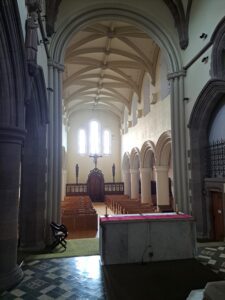 "It is a quiet sanctuary, a reminder of our past, and a space for reflection and prayer at the regular events we host.
"It is a quiet sanctuary, a reminder of our past, and a space for reflection and prayer at the regular events we host.
"The urgent need for roof and masonry repairs was becoming a serious concern, so the £10,000 grant will make a real difference.
"It means we can protect the building’s structural integrity and provide peace of mind to the visitors and staff who use the chapel.”
The £10,000 Wolfson Fabric Repair Grant from the Wolfson Foundation will go towards repairing the roof and masonry to prevent further water damage.
The chapel – opened in 1825 – is home to important heritage, such as stunning stained glass windows by Pugin and a beautiful high altar.
Claire Walker, Chief Executive of the National Churches Trust, said: "The National Churches Trust is delighted to be able to support St Margaret’s Chapel and St Mary’s Cathedral to enable them to carry out urgent repairs.
“Whether seeking quiet reflection, access to community services or a place to worship or explore, the National Churches Trust helps hundreds of churches, chapels and meeting houses each year and with the support of local people, keeps them thriving today and tomorrow.”
The Listed Places of Worship Grants Scheme allows listed churches, chapels, meeting houses and cathedrals to reclaim VAT on urgent repair projects.
It has helped 13,000 places of worship since it was introduced in 2001, the vast majority of them churches.
The Chrism Mass is when the holy oils are blessed and the sacred chrism is consecrated. It is traditionally celebrated on Tuesday of Holy Week at St Mary's Cathedral, with Archbishop Cushley. Priest of the Archdicoese join him to renew their priestly vows
The Chrism Mass is a significant event in the Catholic Church, where the bishop consecrates the sacred chrism (a mixture of olive oil and balsam) and blesses the other holy oils (oil of catechumens and oil of the sick).
The Chrism Mass is a sign of the close bond between the bishop and the priests of the diocese, and it is a time for priests to renew their commitment to their ministry.
When is it celebrated?
Traditionally, the Chrism Mass is celebrated during Holy Week, on the morning of Holy Thursday, but it can be celebrated on another day of the week, or during the Lenten season, as close to Holy Week as possible.
The bishop consecrates the sacred chrism and blesses the other holy oils. Priests renew their commitment to their ministry.
Please pray for the repose of the soul of Sr Mary Rose Moran RSM who died peacefully on Saturday 22 March. She was 93.
Known as Rose, she entered the Order of the Sisters of Mercy in Edinburgh 70 years ago and was based at St Catharine’s Convent of Mercy at Lauriston Gardens.
She was born in Leitrim in Ireland and was involved in education throughout her life.
Sr Mary Rose was a teacher at St Thomas of Aquin’s, Holy Cross Academy and St Augustine’s (all Edinburgh) and taught Religious Education, Dress & Design and Domestic Science.
She was also involved in guidance and school chaplaincies.
Tributes poured in on Facebook following the announcement of her death.
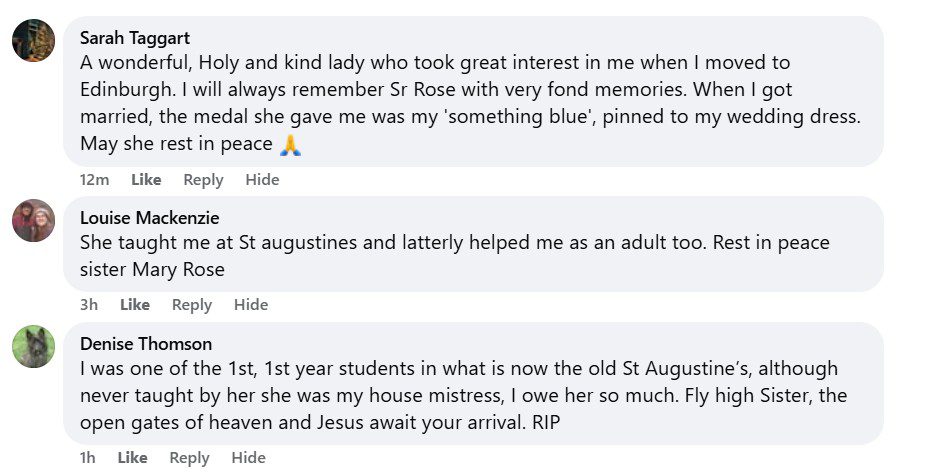
Claire Staines described her as "A great guide through the teenage years".
Sarah Taggart posted: "A wonderful, Holy and kind lady...When I got married, the medal she gave me was my 'something blue', pinned to my wedding dress. May she rest in peace."
In later life Sr Mary Rose did ministry with the divorced and separated and was involved in several Mercy Ministries at St Catharine's.
Sr Aelred Timmins RSM described her as a "beloved Sister of Mercy, who was very kind and helpful".
Archbishop Cushley will be the Principal Celebrant at the Requiem Mass for Sr Mary Rose at St Catharine's Convent of Mercy at 2:00pm on Monday 14 April. All are welcome to attend.
May she rest in peace and rise in glory.